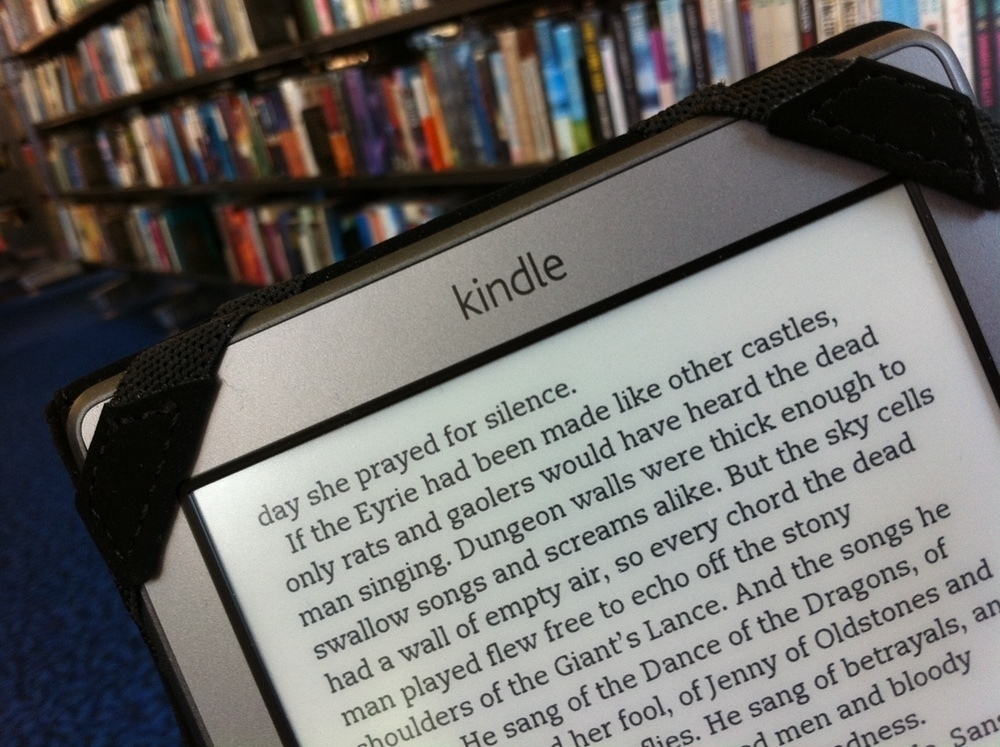Bear with me while I horribly and lengthily belabour an analogy.
The Magic Book Shop
Imagine a magic book shop that delivers. Imagine that if you want to read something, you just announce your request into the air, and the book appears on your bookshelf.
Of course, this still costs money, but the books are cheaper than those from your regular book shop, and the selection is an order of magnitude better.
Sounds great, doesn’t it. You’d quite like to live near a book shop like that.
But what if this book shop only sells books that are a certain shape? It’s a shape that is fitted to a little book case the shop has individually made and sold to you.
Well, you say, that’s OK: although I did have to pay quite a lot for my special book case, it is magically small and portable, and all these books can be with me all the time. So what if they are a special shape?
Well then… what if you wanted to lend your new favourite book to your friend? Great! Except that, while your friend also bought their own book case from the magic book shop, theirs had its own peculiar shape and your book wouldn’t fit on it.
So, no more lending your favourite books to them, nor they you. Everyone has to buy their own from this book shop. And don’t even think about going to a second hand book shop, or borrowing from the Public Library: their books won’t fit in your book case either.
Still like this book shop?
Worse, what if you buy a book from this book shop, only to find that at some point later the shop has reached into your house and removed the book from your special book case, casting it down the memory hole? It’s magic, right? Anything can happen.
A bit worrying though, eh.
Ignoring all that
So yeah, I figured it would be good to get a special book case Kindle.

I am a sad, sad gadget-loving geek. I knew the issues but I did it anyway.
I made excuses. I figured that it might be a good way to get hold of various textbooks I need for work; and also to provide a bit of convenient holiday reading and the occasional free classic from Project Gutenberg.
I got a no-ads Wifi Kindle 4, as per Marco’s review. And… I like it. A lot.
It turns out that the Kindle is simply superb for consumption of the linear narrative: any book that you can start on page one and read to the end without breaking out to refer to a map, an index, or some earlier passage, is well suited to the device.
This means that your holiday reading is well looked after; and the low power requirements of the e-ink display means you’ll almost never run out of battery when you need it. It’s the perfect travel companion. SOLD!
It’s not so good for those textbooks though. Mostly when I’m trying to learn something new I have to re-read chapters, jump back and forward to refer to facts and concepts mentioned earlier, and generally consume the thing in a non-linear fashion. You just can’t do that easily on a Kindle.
There are exceptions: the eBooks generated by Instapaper are wonderful examples and come with an easy-to-navigate table of contents and the ability to easily jump backwards and forwards between “articles” – but most electronic textbooks I’ve bought so far don’t use this kind of formatting. (Ironically, a very useful and completely free textbook does: Pro Git.)
Perhaps advances in technology will improve upon this aspect of current e-reader technology and make riffling, referring, and re-reading through an eBook just as simple and convenient as the paper version. But maybe not.
So what to do?
Thinking a bit wider, I am a little worried by where this eBook thing is going. The Amazon ecosystem is incredibly tempting, but it comes with real restrictions.
I have made a point of stripping the rights management off all the Amazon books I buy, so that they can be used on any other eBook reader I might purchase in future.
That’s good for me, but it doesn’t alter the bigger problem. By supporting the Amazon ecosystem with my cash, I am also reducing the viability of my friendly local paper book store. Over time, collectively me and all the other eBook buyers will affect the rest of the community through a reduced paper book availability as local book shops either disappear or stick to higher volume titles.
As more of the book market moves to electronic formats, the ability to read and gain new knowledge and enjoyment from books becomes dependent on being able to afford a proprietary book reader and the associated technologies required to access the electronic book shop.
And that’s a couple of gatekeepers that we don’t have now when we pick up a paperback, or buy a book for the kids' birthdays.
So I’m definitely conflicted about the whole thing. It’s a great device. But I’m thinking I’ll just use the Kindle for the kind of shitty holiday fiction I’d be too ashamed to buy; reading the classics; occasional textbooks; and for Instapaper.
Books that I want to own and keep and re-read: those I’ll continue to buy on paper.